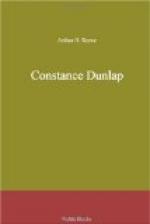“Constance,” he remonstrated, looking fearfully about. Instinctively she felt that her accusation was unjust. Not even that had dulled the hunted look in his face. “Perhaps—perhaps if it were that of which you suspect me, we could patch it up. I don’t know. But, Constance, I—I must leave for the west on the first train in the morning.” He did not pause to notice her startled look, but raced on. “I have worked every night this week trying to straighten out those accounts of mine by the first of the year and—and I can’t do it. An expert begins on them in a couple of days. You must call up the office to-morrow and tell them that I am ill, tell them anything. I must get at least a day or two start before they—”
“Carlton,” she interrupted, “what is the matter? What have you—”
She checked herself in surprise. He had been fumbling in his pocket and now laid down a pile of green and yellow banknotes on the table.
“I have scraped together every last cent I can spare,” he continued, talking jerkily to suppress his emotion. “They cannot take those away from you, Constance. And—when I am settled—in a new life,” he swallowed hard and averted his eyes further from her startled gaze, “under a new name, somewhere, if you have just a little spot in your heart that still responds to me, I—I—no, it is too much even to hope. Constance, the accounts will not come out right because I am— I am an embezzler.”
He bit off the word viciously and then sank his head into his hands and bowed it to a depth that alone could express his shame.
Why did she not say something, do something? Some women would have fainted. Some would have denounced him. But she stood there and he dared not look up to read what was written in her face. He felt alone, all alone, with every man’s hand against him, he who had never in all his life felt so or had done anything to make him feel so before. He groaned as the sweat of his mental and physical agony poured coldly out on his forehead. All that he knew was that she was standing there, silent, looking him through and through, as cold as a statue. Was she the personification of justice? Was this but a foretaste of the ostracism of the world?
“When we were first married, Constance,” he began sadly, “I was only a clerk for Green & Co., at two thousand a year. We talked it over. I stayed and in time became cashier at five thousand. But you know as well as I that five thousand does not meet the social obligations laid on us by our position in the circle in which we are forced to move.”
His voice had become cold and hard, but he did not allow himself to be betrayed into adding, as he might well have done in justice to himself, that to her even a thousand dollars a month would have been only a beginning. It was not that she had be accustomed to so much in the station of life from which he had taken her. The plain fact was that New York had had an over-tonic effect on her.




